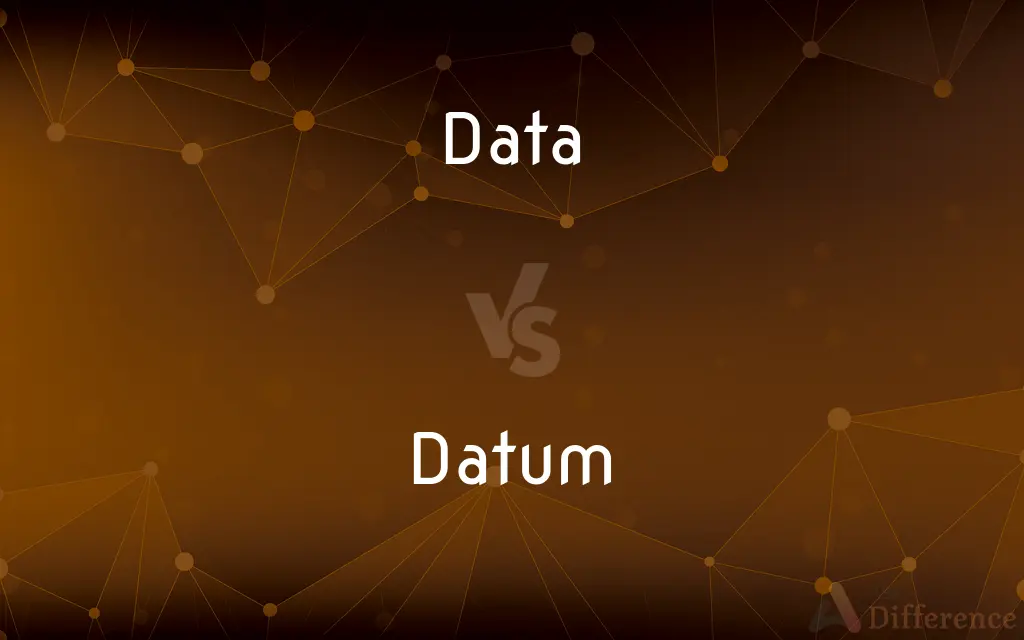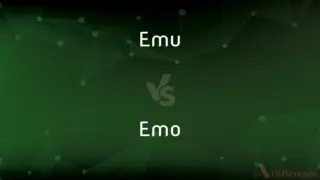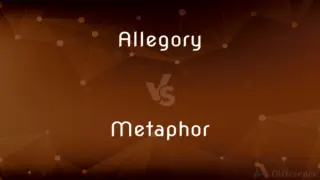Data vs. Datum — What's the Difference?
By Tayyaba Rehman — Updated on September 18, 2023
"Data" is the plural form referring to multiple pieces of information, while "Datum" is singular, referring to one specific piece of information.

Difference Between Data and Datum
Table of Contents
ADVERTISEMENT
Key Differences
"Data" and "Datum" both revolve around information, but their number distinction sets them apart. "Data" is the term you'd use to discuss multiple items of information, whereas "Datum" represents a singular piece.
In many contexts, especially in everyday language, "Data" is frequently used as a singular collective noun to refer to information without considering the individual pieces. "Datum", being singular, is rarely used in everyday conversation but is more specific in nature.
"Data" can be seen as an accumulation of several "Datum". Think of "Datum" as a single point on a graph, and "Data" as the entire set of points that form the graph.
Both terms are derived from Latin, where "Datum" means "something given" and "Data" is the plural form. However, in modern English, especially in fields like computing and information sciences, "Data" has become the prevalent term for both singular and plural contexts.
Comparison Chart
Part of Speech
Noun (typically used as a singular collective noun)
Noun (singular)
ADVERTISEMENT
Refers to
Multiple pieces or a collection of information.
A single piece of information.
Usage
Commonly used in both singular and plural contexts.
Rarely used, mostly in technical or specific contexts.
Example
Datasets, databases.
Single point on a map.
Grammatical Number
Technically plural, but often treated as singular.
Singular.
Compare with Definitions
Data
Information in numerical form that can be digitally transmitted.
The server stores massive amounts of data.
Datum
A fixed starting point of a scale or operation.
Sea level is a common datum for elevation measurements.
Data
A representation of facts or ideas in a formalized manner.
The research paper contained a lot of new data.
Datum
A single piece of information used as a basis for discussion.
The professor took each datum into account during the debate.
Data
Quantities, characters, or symbols on which operations are performed.
The data points were plotted on a graph.
Datum
A single piece of information or fact.
Each datum in the research contributed to the conclusion.
Data
Facts or information collected for reference or analysis.
The data collected from the survey was insightful.
Datum
An individual item of data.
That particular datum stood out from the rest.
Data
Raw information processed by a computer.
The software encrypts all user data for security.
Datum
Pl. da·ta (-tə) A fact or proposition used to draw a conclusion or make a decision. See Usage Note at data.
Data
Data are units of information, often numeric, that are collected through observation. In a more technical sense, data are a set of values of qualitative or quantitative variables about one or more persons or objects, while a datum (singular of data) is a single value of a single variable.Although the terms "data" and "information" are often used interchangeably, these terms have distinct meanings.
Datum
Pl. da·tums A point, line, or surface used as a reference, as in surveying, mapping, or geology.
Data
Plural of datum
Datum
(dated) data; a single recorded observation.
Data
Information, especially in a scientific or computational context, or with the implication that it is organized.
The raw information was processed and placed into a database so the data could be accessed more quickly.
Datum
(plural: data) (philosophy) A fact known from direct observation.
Data
(collectively) Recorded observations that are usually presented in a structured format.
Datum
(plural: data) (philosophy) A premise from which conclusions are drawn.
Data
(computing) A representation of facts or ideas in a formalized manner capable of being communicated or manipulated by some process.
Datum
(plural: datums) A fixed reference point or set of reference points which precisely define a system of measurement or a coordinate system.
Data
Senseid|en|telephony}}(mobile telephony) {{ellipsis of mobile data: digital information transmitted using the cellular telephone network rather than Wi-Fi.
Run out of data
Datum
(plural: datums) (nautical) A floating reference point, or SLDMB, used to evaluate surface currents in a body of water. Often employed by coastal search and rescue.
Data
See Datum.
Datum
To provide missing data points by using a mathematical model to extrapolate values that are outside the range of a measuring device.
Data
A collection of facts, observations, or other information related to a particular question or problem; as, the historical data show that the budget deficit is only a small factor in determining interest rates.
Datum
Something given or admitted; a fact or principle granted; that upon which an inference or an argument is based; - used chiefly in the plural.
Any writer, therefore, who . . . furnishes us with data sufficient to determine the time in which he wrote.
Data
Information, most commonly in the form of a series of binary digits, stored on a physical storage medium for manipulation by a computer program. It is contrasted with the program which is a series of instructions used by the central processing unit of a computer to manipulate the data. In some conputers data and execuatble programs are stored in separate locations.
Datum
A single piece of information; a fact; especially a piece of information obtained by observation or experiment; - used mostly in the plural.
Data
A collection of facts from which conclusions may be drawn;
Statistical data
Datum
The quantities or relations which are assumed to be given in any problem.
Datum
A point, line, or level surface used as a reference in measuring elevations.
Datum
An item of factual information derived from measurement or research
Datum
A starting point or reference in calculations.
The surveyor took a datum before measuring.
Common Curiosities
Can "Datum" be used in contexts outside of data analysis?
Yes, "Datum" can refer to any singular piece of information or a reference point.
Do most people use "Data" or "Datum" in everyday speech?
Most people use "Data" in both singular and plural contexts in everyday speech.
Can "Datum" refer to a point on a map?
Yes, "Datum" can refer to a single reference or starting point on a map.
Is "Data" always numerical?
No, "Data" can be textual, numerical, visual, or in other formats.
Why is "Datum" less common than "Data"?
Over time, "Data" has become a standard term for both singular and plural contexts, making "Datum" less common.
How do "Data" and "Datum" relate to databases?
Databases store "Data", while each individual entry or piece of information is a "Datum".
Do other languages distinguish between "Data" and "Datum"?
The distinction originates from Latin, but the usage in other languages varies based on linguistic norms.
How are "Data" and "Datum" pronounced?
"Data" is often pronounced as "day-tuh" or "dah-tuh", while "Datum" is "day-tum".
Can "Datum" mean a basis for discussion?
Yes, "Datum" can refer to a piece of information used as a basis or reference for discussion or debate.
Is "Data" singular or plural?
Technically, "Data" is plural, but it's commonly used as singular in modern English.
Is it incorrect to use "Data" as singular?
While traditionally plural, using "Data" as singular has become widely accepted, especially in non-technical contexts.
Can "Datum" refer to a single observation in research?
Yes, "Datum" can refer to a single observation or measurement in research.
How do I decide whether to use "Data" or "Datum"?
Consider context and number. If referring to multiple pieces of information, "Data" is appropriate. For a single piece, "Datum" is technically correct.
Are there disciplines where "Datum" is still commonly used?
Yes, in some technical and academic fields, the distinction between "Data" and "Datum" is still maintained.
Is it common for languages to have singular/plural distinctions like "Data" and "Datum"?
Many languages have singular/plural distinctions, but the specific rules and examples vary widely.
Share Your Discovery

Previous Comparison
Emu vs. Emo
Next Comparison
Allegory vs. MetaphorAuthor Spotlight
Written by
Tayyaba RehmanTayyaba Rehman is a distinguished writer, currently serving as a primary contributor to askdifference.com. As a researcher in semantics and etymology, Tayyaba's passion for the complexity of languages and their distinctions has found a perfect home on the platform. Tayyaba delves into the intricacies of language, distinguishing between commonly confused words and phrases, thereby providing clarity for readers worldwide.














































